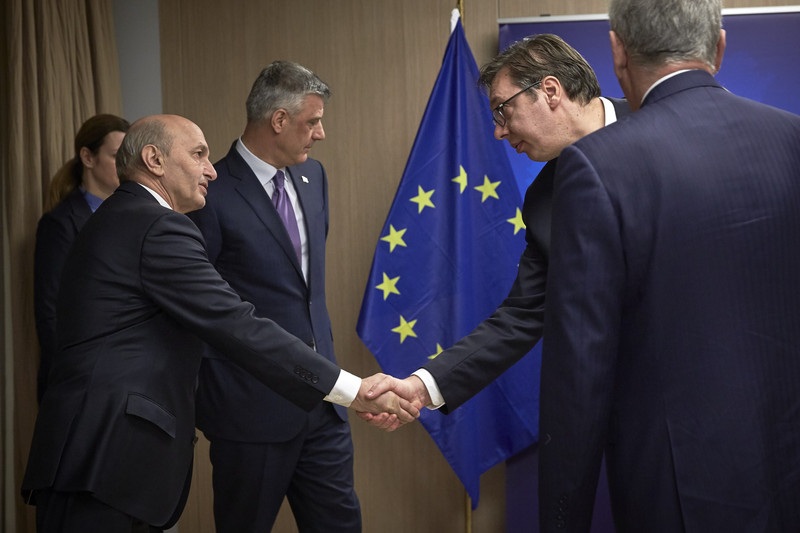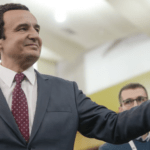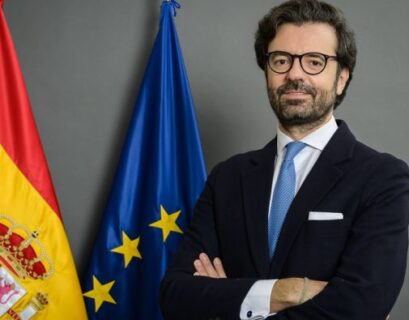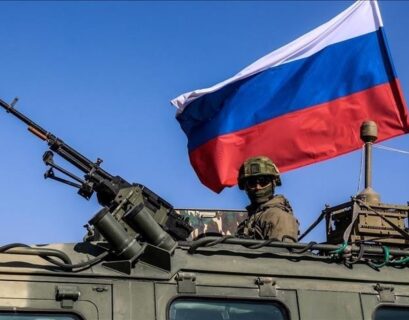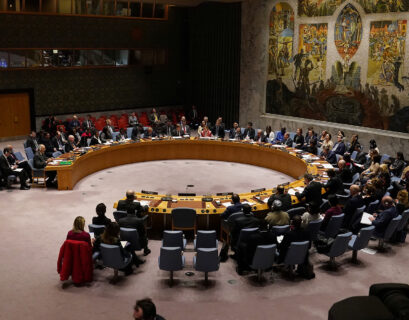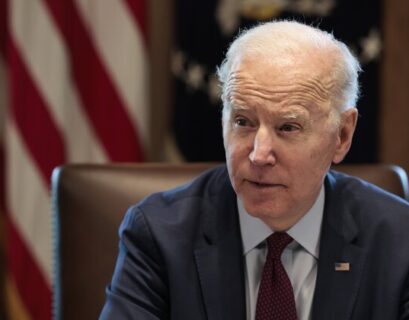SONJA BISERKO
Any discussion about Serbia-Kosovo relations has to take into account the international context and interests of some global players that strongly influence regional dynamics, relations between Serbs and Albanians included. kbhjbbbjk
In the early 1990s at the outbreak of Yugoslav wars, the liberal order that implies international cooperation was still functional. That was evident in the way the Contact Group coped with the Yugoslav crisis, and in operations of other mechanisms in which major international players were involved. International engagement was in the function of bringing the Balkans in transatlantic integration. In addition to the aspect of security (NATO), EU member-states operated in the Balkans through soft power with and economic integration. Dynamic of the Balkans’ integration depended on the region’s potentials. However, the financial crisis (2008) changed EU’s priorities, while Brexit, Donald Trump’s presidency and Russia’s penetration into the region (2013) disturbed its existing agenda.
There is no telling so
far what will come out of EU’s attempt – Germany’s in the first place – to
effectuate normalization through Belgrade-Pristine dialogue, and consequently
Kosovo’s recognition and its membership of UN.
The Brussels dialogue,
which resulted in an agreement and a number of other special agreements, was unfortunately
halted was halted the moment Commissioner Mogerini changed the format of
dialogue and accepted the deal the two presidents, Thaci and Vučić, made on
Kosovo’s partition. Partition of Kosovo has always been Belgrade’s only option,
but it was surprising that Thaci and Albanian Premier Rama said yes to the
deal. The deal also had the support of certain international circles, but
failed thanks primarily to German opposition to changing borders.
Tariffs imposed on the
goods from Serbia, assassination of Oliver Ivanović and a number of other
developments have led to blocking of dialogue and raised tensions.
The recent Kosovo
elections and the victory of Albin Kurti (Self-determination and LDK) have
changed the political panorama in Kosovo and opened up the possibility of
creating a new framework for dialogue and a possible solution.
The results of the
Kosovo elections have led to a relaxation in Kosovo society and raised
expectations regarding the fight against corruption and addressing every day
problems. Albin Kurti is a politician without a war record or corruption in his
file. He immediately announced lifting of 100-percent- tariffs that enables
reopening of the dialogue with Serbia. He also announced the principle of
reciprocity requesting equality for Kosovo in its dialogue with Serbia.[1]
Thaci and Haradinaj are
true electoral losers, mostly because of irresponsibility they have
demonstrated at home and at international scene. Their foreign policy ended up
in a fiasco – their policy for visa liberalization failed and Kosovo was not
admitted to Interpol and UNESCO. Belgrade’s campaign against Kosovo’s
recognition resulted in withdrawals by some smaller countries. Hence, repute
and opportunities for the young state of Kosovo were seriously undermined. No
doubt that Kurti’s unyielding stance about Kosovo’s sovereignty and territorial
integrity considerably decided the electoral outcome.
Albin Kurti denies
recognition to the Serbian List that won all the ten minority seats in the
parliament. He argues that it does not represent Kosovo Serbs but the Serbian
government.
Another electoral loser
in Kosovo is President Vučić, who had strongly influenced developments in
Kosovo via the Serbian List under his control. Belgrade is dissatisfied with
the outcome of elections as it no longer has the partner to deal with on
Kosovo’s partition (Thaci), it is particularly dissatisfied with the fact that
Kurti becomes prime minister. It still hopes that US would exert pressure on
LDK to make a coalition with Thaci’s party that ranks third by the number of
votes won. Apart from Vucic and his environment, disappointment with the
election results is not hidden by other actors in the Serbian scene and it can
be said that there is consensus in this respect.
They mostly argue that Kurti’s
“extremism” and messages he has put across “leave no room for improvements, reducing
tensions and continuation of negotiations.” Commenting on Kurti’s victory,
Serbian tabloids ran headlines labeling him “A European Šešelj,”[2] “Serb-hater,[3] and
“Great Albania dreamer.”[4] President
Vučić himself called him “a most dangerous man.”[5]
Current political elites in Belgrade, Prishtine and Tirana as well are
conspiring against Albin Kurti hoping that Kosovo might go to the polls again. While
speculations in this regard multiply, Kurti continues to meet all major
partners from the EU and the US.
Serbia looks forward to
Americans’ influence on the composition of Kosovo cabinet. However, as things
stand, the West and US have accepted Kurti as a new leader capable of coping with
corruption and crime. As indictments from The Hague will be coming in soon,
Kurti is probably the only politician ready to extradite the accused.
The fact that US
appointed two special envoys for Kosovo and the Western Balkans leads to the
conclusion that it would try to speed up a settlement. It allegedly plans to
force Serbia and Kosovo to take their seats at the negotiating table and reach
a sustainable solution. US’ primary objective is to suppress Russia from the
Balkans and have the Western Balkans in the membership of NATO. President Vučić
is barely pleased with these possibilities. His statements following on his
meeting with newly appointed US envoy Richard Grenell were rather pessimistic.
Belgrade has all its
hopes on Russia in terms of reaching a “Kosovo compromise” that is
partition. Because, as many point out, “Russian support is essential for
the survival of the Republika Srpska as much as it is for the defense of Kosovo
and Metohija.[6]
In addition, given the changed
international circumstances, Belgrade reckons that Russia has a number of
reasons to support Serbs in national positions of vital interest, regardless of
its relations with Washington. Vučić pins his hopes on the meeting with
President Putin, scheduled for late 2019. Russian Premier Medvedev’s visit to
Belgrade also symbolically mirrored Belgrade’s expectations from Russia.
Ever since it
resolutely stepped in the Balkans (2013) Kosovo has been Russia’s main argument
– and instrument – for blocking the region’s movement towards Euro-Atlantic
integrations. Regressive trends in each country of the region only strengthened
Russia’s influence on overall developments. Democratic capitalism has been less
and less attractive to Western Balkan countries; hence, they have been more and
more turning towards other players such as Russia, China, Turkey or UAE.
Alternatives to modernity the latter are offering are anyway more appealing to
incumbent authoritarian leaders in the region. Besides, those players are
placing financial resources for infrastructural projects in their hands.
Actual geopolitical
circumstances in the Western Balkans and, especially, the inertia of EU (as it
let down Macedonia and Albania) open up more room to Russia’s presence, even in
the countries wherefrom it has been expelled recently (Montenegro and
Macedonia). As status quo in Kosovo perfectly suits Russia; hence, it has been
invoking UNSC Resolution 1244. The key to the problem of Kosovo is, in a way,
in Russia’s hands, rather than Serbia’s. Besides, at the hearing in the
European Parliament, Jose Borrell, EU’s newly appointed commissioner for
foreign policy, reminded that Kosovo could not be a state unless recognized by “China,
India and Russia.”[7]
Even the “Small
Schengen” project Vučić has been offering to Albania and North Macedonia plays
into Russia’s hands.
For, if EU neglects the
Western Balkans (French President’s decision to prevent opening of accession
negotiations with North Macedonia and Albania), its credibility in the region
will be sloping downward.
Russian analysts also
argue for a status quo in Kosovo. Katarina Entina of the High School of
Economics predicts yet another backward step in negotiations, and says that
Kosovo is not on America’s priority list; as Trumps has begun campaigning for
another presidential term, he cannot be expected to take some stronger stand
about Kosovo, so everything will remain as it is for another year and a half.
EU also needs to protract Serbia’s progress in the fulfillment of technical
requirements for its membership. Therefore, speeding up the solution to the
Kosovo issue suits neither EU nor Trump; so, “the dialogue will be only formal
and technical.”[8]
Western policy for the
Balkans has been unproductive because it has excessively banked on corrupted
elites in power and the promises they made. Having neglected democratization –
and, hence, the media, civil society and opposition – it enabled strengthening
of authoritarian regimes and leaders.
No major progress
towards stability and sustainable peace could be expected in the Balkan region
unless it is crime cleansed. This is why Kosovo elections and Albin Kurti’s
victory heralds of a new era in the Western Balkans. It will not be a process
without resistance and violence, but it is certainly the only way to change the
paradigm so far. And the hints we witness now require stronger presence of EU
in the region, and its full support.
To sum up, the region necessitates thorough reforms, which the Western world is facing also with great resistance. It is necessary to restore faith in the liberal system and institutions. Only in this key can the Kosovo issue, as well as all other relations in the Balkans, be resolved. That’s the only key to the solution of the Kosovo problem, and all other problematic relations in the Balkans.
—————–
Sonja Biserko is a Serbian campaigner for human
rights. She is the founder and president of the Helsinki Committee for
Human Rights in Serbia.
Biserko
is the author of Srbija na Orijentu (Serbia in the East)
and Yugoslavia’s Implosion: The Fatal Attraction of Serbian Nationalism.
Among some 140 other publications she has written about the Srebrenica genocide,
the fall of Vukovar,
the wars in the former Yugoslavia and war crimes and accounts of the trials of
Slobodan Milosevic and Vojislav
Seselj. Sonja Biserko was a founding member of a European
movement in Yugoslavia, the Center for Anti-War Action in the Belgrade Forum
for International Relations.
[1] This
is very important given that Serbia obstructs free flow of people and good from
Kosovo, and would not recognize Kosovo documents and certificates on its
products if labeled the Republic of Kosovo. .
[2] https://rs-lat.sputniknews.com/autori/201510151100301837-kurti-kosovo-samoopredeljenje/.
[3] https://informer.rs/vesti/politika/437225/susret-dvojice-ekstremista-osvedocenih-srbomrzaca-suljo-kurti-prave-pakt-protiv-srbije.
[4] https://www.telegraf.rs/vesti/politika/2989904-jedan-od-najradikalnijih-albanaca-s-kosova-otvoreno-zatrazio-pomoc-iz-tirane-kurti-opet-sanja-veliku-albaniju.
[5] https://www.kurir.rs/vesti/politika/3343077/uzivo-predsednik-vucic-evo-sta-mu-je-rekao-medvedev-i-sta-ce-biti-sa-kosovom-i-metohijom.
[6]
Pečat, September 20, 2019.
[7] http://www.rtv.rs/sr_lat/politika/borel-dogovor-srbije-i-kosova-ce-biti-moj-prioritet_1054818.html
[8] https://rs-lat.sputniknews.com/rusija/201910071120980456-ruski-pogled-na-kosovske-izbore-niko-ne-zeli-kompromis-sa-beogradom


